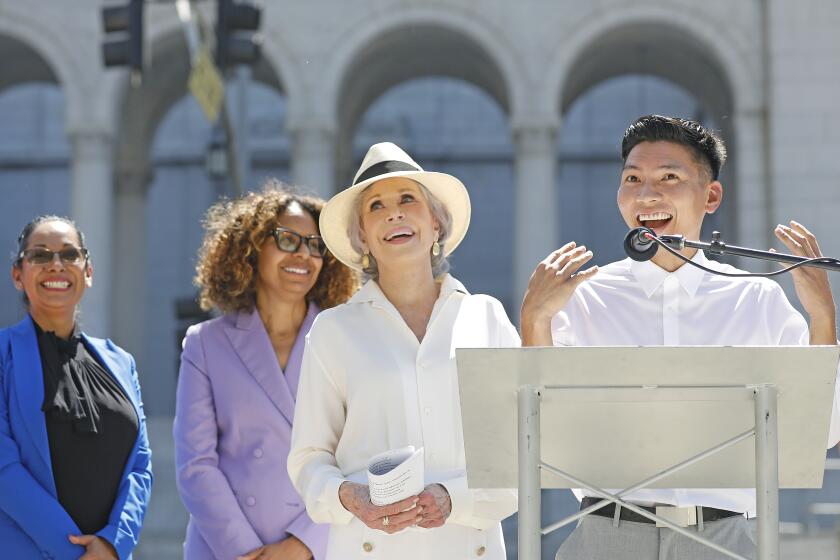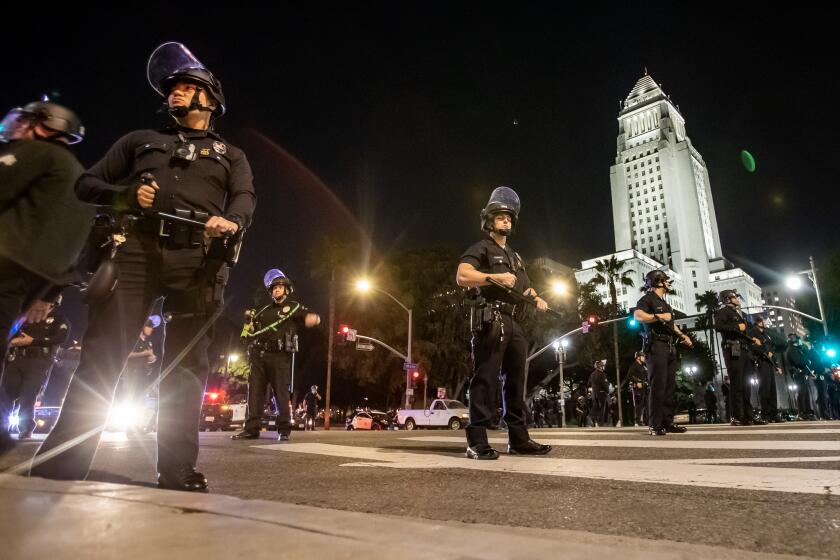Young activists helped elect Kenneth Mejia. Now some say he’s a ‘toxic’ boss
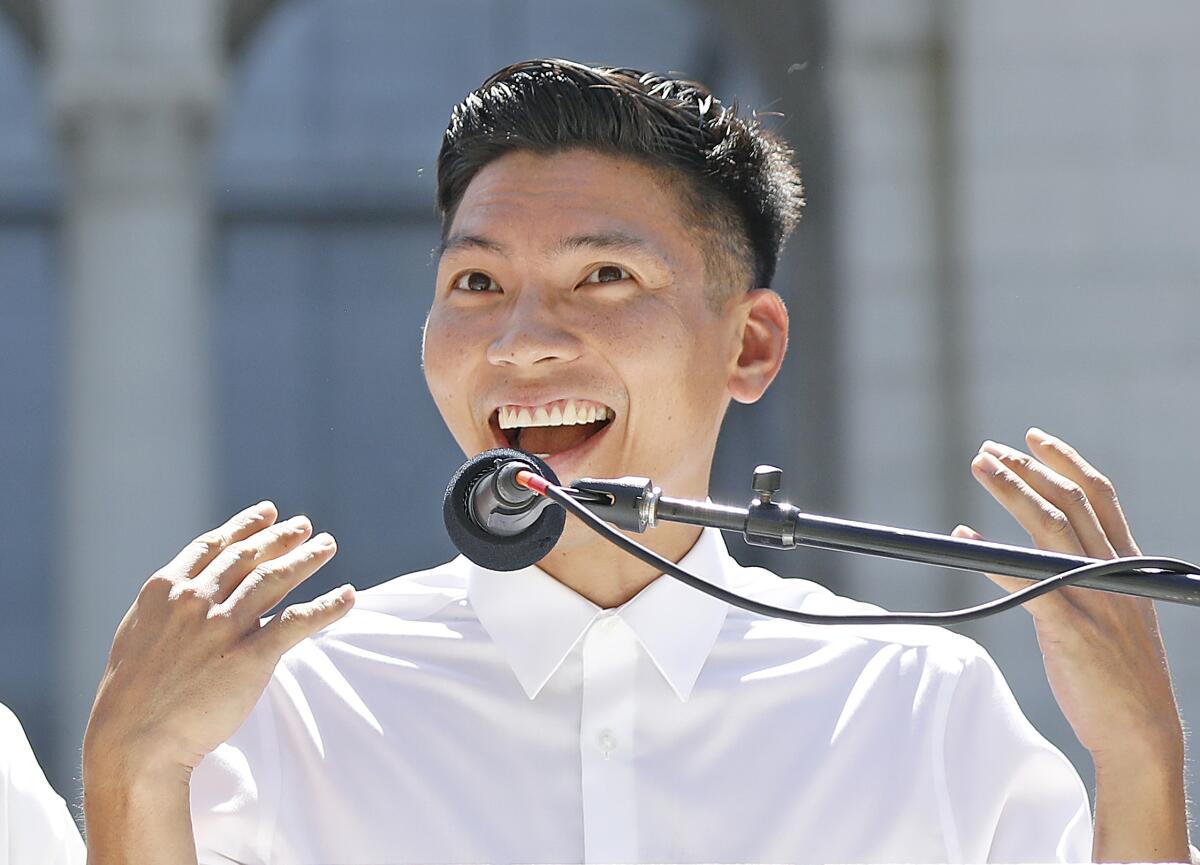
- Share via
While he was a Pikachu-costume-wearing, corgi-toting leftist candidate, Kenneth Mejia’s unorthodox style helped fuel his insurgent campaign for Los Angeles city controller.
But less than six months after Mejia, 32, trounced a career politician to win the job, two former employees allege that he created an uncomfortable work environment where personal boundaries were often blurred both in the controller’s office and on the campaign.
They say Mejia frequently made comments about the sex lives of two young campaign workers before his election and pressured employees and former campaign staffers to move into his apartment building after the election.
Mejia’s office denied the accusations and said the alleged issues were never brought up with Mejia or other senior team members before being shared on social media this week.
“What’s with politicians whose names start with K that are ‘progressive’ but terrible and toxic bosses?” Shekinah Deocares, a former campaign staffer who spent several months as the director of community engagement for the controller’s office, tweeted Monday morning.
She paired the question with two pairs of oversize eyeballs and a thinking-face emoji and followed it up with a series of accusations in subsequent tweets.
“To be clear I’m talking about @kennethmejiaLA @lacontroller who just pushed out @kyler_chin who made ALL of the resources for his campaign and office a couple months after pushing me out because he didn’t value community work and thought it was a nuisance,” Deocares declared in a Twitter thread that quickly began ricocheting around Los Angeles City Hall.
Mejia’s social media savvy played a key role in his rise from a little-known certified public accountant to a nationally watched progressive darling, especially when paired with other unconventional tactics, such as billboards showing how much of the city budget went toward police spending. Gen Z climate activists were also a highly visible part of his grassroots campaign, with the group even profiled in Teen Vogue.
Now, the outsider candidate is a citywide elected official, managing more than 160 employees and acting as fiscal watchdog for the nation’s second-largest city.
And some of those same young supporters are attacking Mejia on the very platforms where they once helped boost his campaign. It’s a decision they describe as difficult but necessary for the sake of accountability.
Kenneth Mejia wins the race for L.A. city controller, becoming the first Asian American elected to citywide office in L.A.
Speaking to volunteers at his election night victory party, Mejia’s campaign manager, Jane Nguyen, recalled that she had been asked “over and over again” whether she would condemn the off-hours actions of the campaign’s young volunteers, which included divisive tactics such as disrupting mayoral forums with shouted profanities.
“ ‘Do you condemn them for protesting? For disrupting a meeting?’ ” Nguyen recalled being asked. “Here’s what I have to say about that: I mean, f— that,” Nguyen continued as Mejia grinned and the crowd cheered and chanted, “F— that.”
Internecine conflict in a local politician’s office is hardly unusual, but it’s atypical to see former staffers air complaints so publicly — particularly just months after an official has taken office.
Deocares, a 26-year-old community organizer, and Kyler Chin, a 19-year-old computer science whiz who built Mejia’s campaign data resources, were among his first hires as controller-elect, taking senior jobs on his executive team. Deocares left the office in February, and Chin, the innovation and technology director, was fired on Monday, he said.
Both were also paid to work on the campaign, as was Deocares’ boyfriend, 22-year-old climate activist Sim Bilal.
The trio is part of a tightknit group of young activists who have been playing an increasingly visible role in local politics.
“We understand that they’re feeling angry, hurt and disappointed — and lashing out after a friend is terminated. But the accusations made simply aren’t true — or [are] so absurdly distorted as to render them false as well,” Nguyen, who now serves as Mejia’s chief of staff, said in an emailed statement Tuesday evening. “None of these accusations or issues with Kenneth were ever brought up to him or other executive team members before. At the end of the day, Shekinah’s departure and Kyler’s termination were strictly the product of work-related issues.”
Nguyen said the “departures were preceded by collaborative, positive, and respectful efforts to address an inability to satisfy the demands of public service.” She alluded to performance issues that played a role in Chin’s termination, as well as the fact that Chin, a full-time city employee, had decided to return to full-time, in-person college classes without discussing it with his supervisor.
She also described Bilal, Deocares and Chin as friends who “will always be a part of our team’s legacy,” which “makes this situation even harder for everyone involved.”
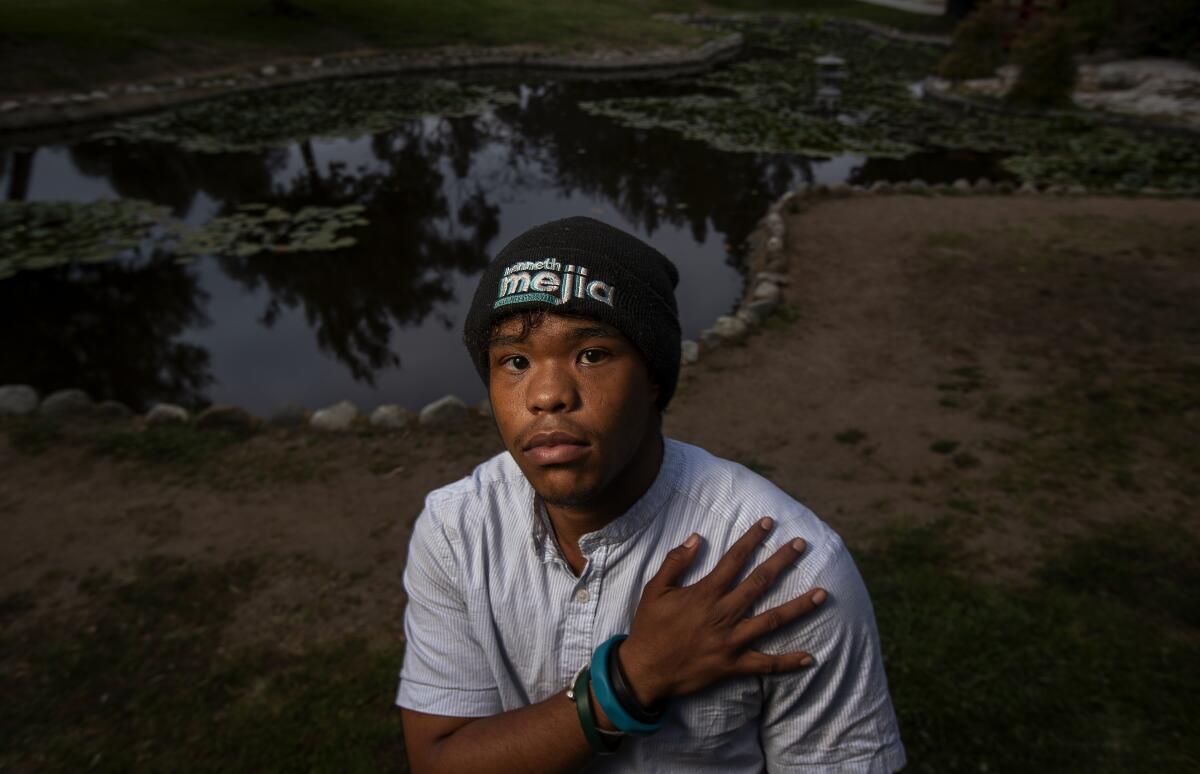
Deocares and Bilal say Mejia frequently made comments about their sex life during the campaign, sometimes in front of other staffers in his campaign office.
Mejia would also “make sex noises” and sometimes moan her partner’s name in an apparent imitation of intercourse, Deocares told The Times.
“People definitely felt uncomfortable and told him to stop, but then, like, you know, he just kept going,” Bilal said.
Mejia’s office denied those accounts.
“Sim and Shekinah are likely mischaracterizing attempts by Kenneth to ask them to tone down their public displays of affection in the campaign office,” Nguyen said by email, describing the campaign as a “collegial environment” with many young volunteers. “There were no other comments about Sim and Shekinah’s sex life.”
The alleged behavior stopped after Mejia’s election, but Mejia’s boundaries with his young employees remained blurry, Deocares and Chin said.
“It was extremely uncomfortable,” Deocares said. “I think he crossed the line between personal and professional a lot.”
Mejia encouraged city employees and former campaign staffers to rent apartments in the same building near downtown where he and his wife lived, Deocares, Chin and Bilal said.
Chin, the 19-year-old former innovation and technology director, ultimately moved into the building, sharing an apartment with Vincent de Vera, 36, the director of special projects at the controller’s office. De Vera told The Times that he did not feel pressured to move in.
Nguyen also moved into the building, Deocares, Bilal and Chin said.
A property manager at the building said the company offers residents a $500 referral fee for each unit someone moves into. Nguyen confirmed that Mejia received $1,000 in referral fees.
Nguyen said via email that Mejia knew that Deocares, Bilal and Chin were looking to live near downtown and “provided the type of advice that any close friend provides in situations like this — always at their invitation, and without any coercion.”
Bilal said Mejia kept asking about an open apartment in the building, which Bilal and his girlfriend did not want to move into. “He just, like, kept pushing it,” Bilal said.
Mejia sent multiple text messages to the couple in late November and early December about the apartment, according to screenshots reviewed by The Times, and brought the topic up verbally, Bilal said.
“We wanna live by ourselves Kenneth,” Deocares finally wrote in the group chat with her boss and her boyfriend. “We really need our own space.”
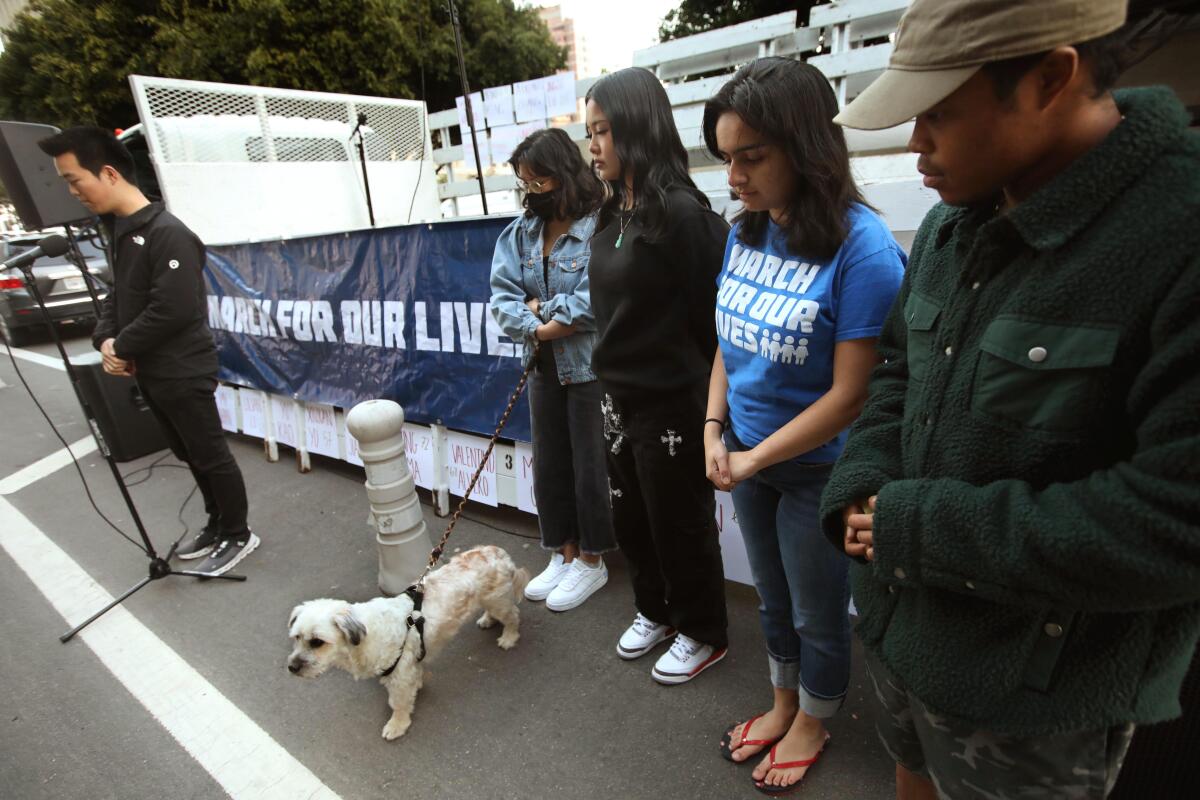
Chin ultimately moved into the unit.
“He was really, really pressuring me to take it,” Chin said of the apartment he said he moved into in January.
The situation was “OK at first,” Chin said, citing the workouts that Mejia, a former personal trainer, would assist him with in the building’s gym several evenings a week. He described Mejia as like a “big brother” who would share his protein powder and let him hang out if he got locked out of his own unit.
But the young employee ultimately found it “extremely stressful to have him be at the same place where I was living.”
Chin was also bothered that his roommate and Mejia hosted a party for fellow members of the controller’s executive team in his shared apartment one Saturday afternoon while Chin was out, he said.
He learned of the party when a photo of colleagues playing beer pong in his living room was uploaded to the controller’s office Discord server, Chin said.
“This is incorrect,” Nguyen said, explaining that Chin and his roommate were both allowed to invite people over to the common areas of their shared apartment. “No photographs from the event were uploaded to the controller’s office Discord server.”
The photograph was actually posted to someone’s Instagram, De Vera said Tuesday. He also clarified that members of the controller’s executive team had been playing “water pong,” not beer pong.
The LAPD’s largest union asked city attorney for a meeting to create protocols for interactions between Mejia’s team and police. She has declined for now.
Other issues raised by the former employees echo the broader fissures increasingly common in American workplaces since the COVID-19 pandemic.
Chin and Deocares said they had thought their jobs would be remote with flexible hours and chafed at the ultimate 9-to-5 workplace expectations.
“It was more casual, but then, like, he would get mad at us for standards or rules that were never communicated to us,” Deocares recalled.
Mejia installed a pingpong table in a City Hall East break room, favors tracksuits and frequently brings his corgis Killa and Kirby to a partitioned area in his executive suite, former employees said. But ultimately, the onetime activist still runs a government office.
Deocares also bristled at the idea that her employer should have rules governing her personal social media accounts, or what kind of political events she could attend in her off hours, saying Mejia had asked her to seek approval to go to events ahead of time.
Chin — a college sophomore who said he had never had a paid full-time job before — held a senior position on Mejia’s team.
He said that as a programmer he preferred to work when “the creative juices are flowing” rather than during a continuous eight-hour period, which he said was not feasible for him.
Chin said that when he was confronted about the need to work a traditional 40-hour week he said he should be granted accommodations for his depression.
“You’re basically forced to work, like, every single day. If you don’t, they kind of scold you for that,” Chin said, later clarifying that he meant every day during the workweek, not weekends.
The fact that he was also attending classes at UC Irvine sparked further contention.
Chin said he took a part-time course load during the winter quarter but returned to full-time in-person classes in April. His return to full-time college coursework played a role in his firing, he said.
“Kyler enrolled in coursework without discussing this decision with his supervisor. This decision came as a surprise to everyone on the team. His enrollment in full-time in-person classes at a university 45 miles away is fundamentally incompatible with the expectations of his demanding, full-time job,” Nguyen said via email.
Deocares quit in February, but said she initially stayed quiet about her issues because of her hope for the progressive movement in Los Angeles.
She believes that a City Hall that puts people and community first is possible, she said, and doesn’t want Mejia to be “canceled.”
“But at the same time, I think he needs to do a better job as a boss,” she said.
Times staff writers David Zahniser and Dakota Smith contributed to this report.
More to Read
Sign up for Essential California
The most important California stories and recommendations in your inbox every morning.
You may occasionally receive promotional content from the Los Angeles Times.

